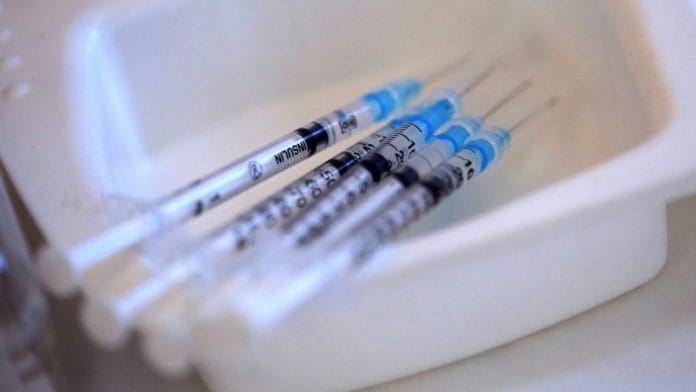It’s “chaos.” A “fiasco.” A “disaster.” Skimming the headlines, you’d be forgiven for the impression that the European Union has already failed in the most important counterattack against SARS-CoV-2: getting people vaccinated. Surely somebody, somewhere — Brussels? Berlin? Paris? — should resign.
Let’s all calm down instead. What’s true is that the EU is currently trailing vaccination bellwethers like Israel and the U.K. and a few other rich countries such as the U.S. But please, it’s February. The first shots in Western countries were approved and administered in December. Covid-19 itself was only declared a “pandemic” less than a year ago. A bit of perspective is in order.
An un-hysterical interpretation of the situation leads to the uplifting conclusion that some people have achieved astonishing feats and others are doing quite well in circumstances of bad or missing information, while a few are — understandably — confused and overwhelmed, but by no means beaten.
It used to be assumed that producing vaccines of any type takes years, if not decades. So it’s a huge success that we now, just over a year after Covid-19 appeared, have several on the market, with new ones joining every month. Some of these biotechnologies may eventually save us not only from Covid-19 but also from other killers including cancer.
That success wasn’t a foregone conclusion throughout most of 2020. Even as they placed their bets and funded different research efforts, policymakers didn’t know which — if any — of these shots would work. What they did know and had to keep in mind, as I argued in July, was that whichever vaccines came to market first would face at least two big problems.
One was, obviously, that the supply would start small before ramping up. So difficult decisions would have to be made about which countries, and which people within each country, would get dibs. This was never going to be fun, and somebody was going to complain in any scenario.
The other big fear was that anti-vaxxers would start a movement to refuse jabs en masse, thus dooming the overall effort to achieve herd immunity. So governments and regulators faced a trade-off. Be thorough and careful — and be criticized for being slow. Or go faster but run the risk of discovering unacceptable side effects too late, thus feeding anti-vaxx conspiracy theories.
On this spectrum, the U.S. and U.K. were slightly quicker than the EU with the first couple of vaccines. Encouragingly, though, they all seem to get the same answers in the end. Populations appear to be getting more confident about vaccination. This is itself a huge success.
The supply problem currently looks harder. Because the scale of these rollouts is unprecedented, several companies have hit bottlenecks. On the whole, they seem to be coping admirably. One drugmaker, Sanofi, whose own vaccine effort was stalling, is even repurposing its factories to churn out vials for a rival.
The biggest supply snafu besets the Anglo-Swedish firm AstraZeneca Plc. In a collaboration with Oxford University, it aims to supply rich and poor countries alike — and isn’t even asking for a profit while the pandemic’s raging. And last week it finally got approval from Europe’s regulators.
But making vaccines isn’t like producing office furniture or breakfast cereals, as some Brussels officials seem to think. The output of factories depends on biological processes such as the growth of cell cultures. And the ones in AstraZeneca’s Belgian plant didn’t play along, even as their siblings at facilities in Britain and elsewhere kept sprouting.
Because that Belgian factory was part of the supply chain intended to meet demand on the continent, the company had to downgrade its supply forecast for the EU, from a promised 80 million during the first quarter to 31 million, now re-upped to 40 million.
The EU’s politicians and media decided to be outraged. AstraZeneca is in breach of contract, they suggested. In fact, its agreement only says — and what else could it say? — that the firm will supply according to its “best efforts.” Haplessly, its chief executive officer tried to explain the subtleties. But the politicians didn’t want to hear them, proving once again, as my colleague Chris Hughes pointed out, that “no good deed goes unpunished.”
If there was a mistake made, it was the political blunder by the EU that came next. Feeling that it wasn’t fair that AstraZeneca could keep supplying the Brits while slowing down the EU’s rollout, Brussels contemplated export controls. Predictably, that sparked outrage in Britain, Canada, Japan and elsewhere, even in Ireland, cleft as it is nowadays by an EU border. The EU, which prides itself on being an antidote to “nationalism,” risked looking hypocritical. Fortunately, Brussels seems to have called the whole plan off.
And there we are. It’s hardly surprising that tempers flare and people get impatient when folks are getting sick and dying. We’re in a pandemic after all. Did anybody think this should be easy?
But all involved appear to be doing their best, which in some cases is already better than anything we had reason to hope for. Some time this year, most Europeans who want shots will get them. How about being grateful for that? – Bloomberg Opinion
Also read: US hits milestone with more vaccinations than Covid cases






